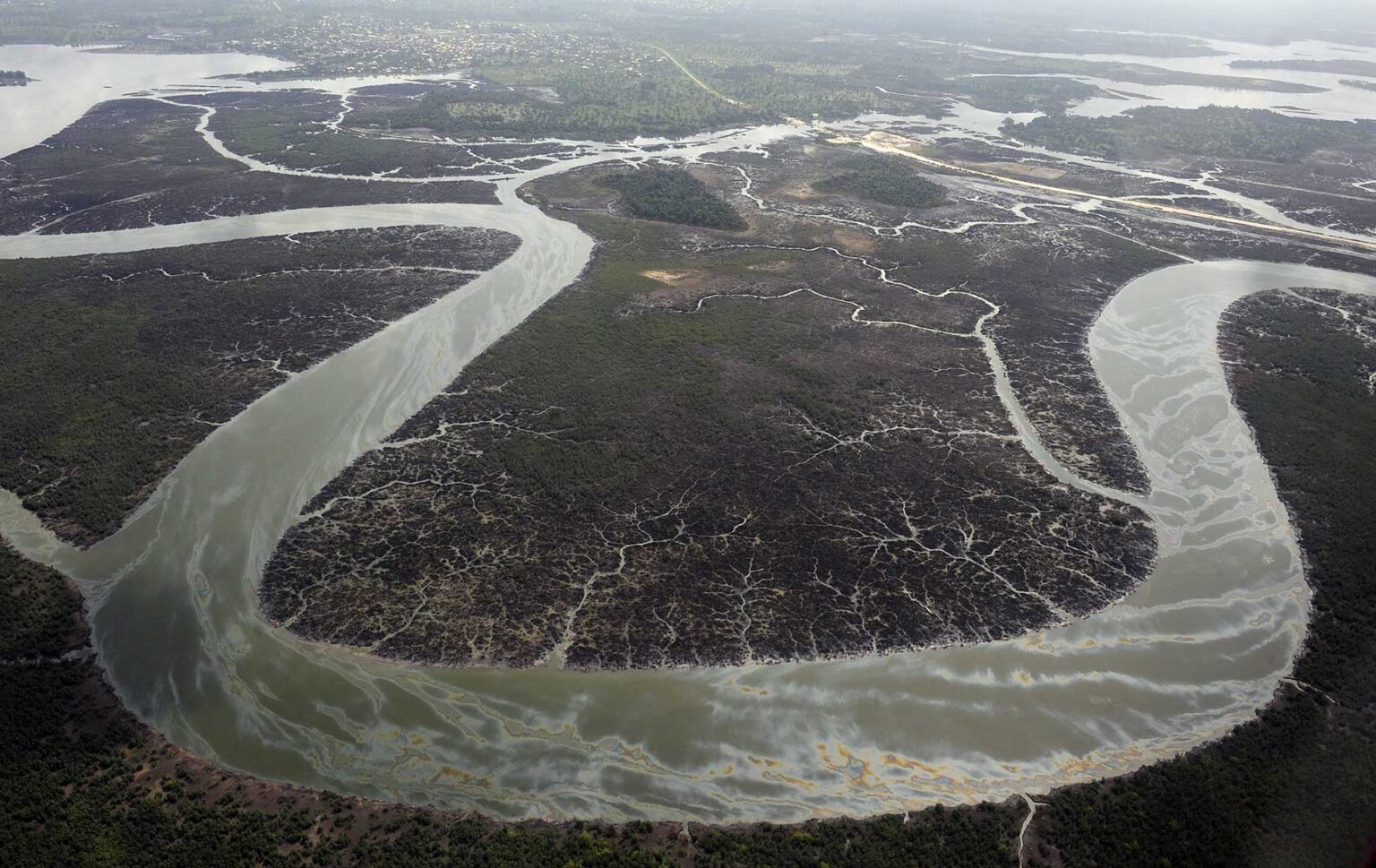Nigeria’s obsession with oil and the history of its leaders syphoning off oil revenues have had a huge impact on the country as a whole and the Niger Delta in particular. It has created a perception that the best way to make money is by tapping into oil money by whatever means possible, whether through oil theft, fuel subsidy scams, or illegal refining. Petrocrime has permeated the Delta in much the same way that oil spills have soaked into the region’s soils.
When Nigeria became independent in 1960, hopes were high that the new nation could use its natural resources to build a strong economy, but this potential has not been realised. Its first decades as an independent state were punctuated by long periods of military rule, until the return to civilian government in 1999. Yet all its governments have had one thing in common – an all-pervasive obsession with oil. Some of Nigeria’s “big men” became very wealthy indeed by syphoning off oil revenues, with Transparency International estimating that military ruler Sani Abacha took up to $5 billion in public money between 1993 and 1998.
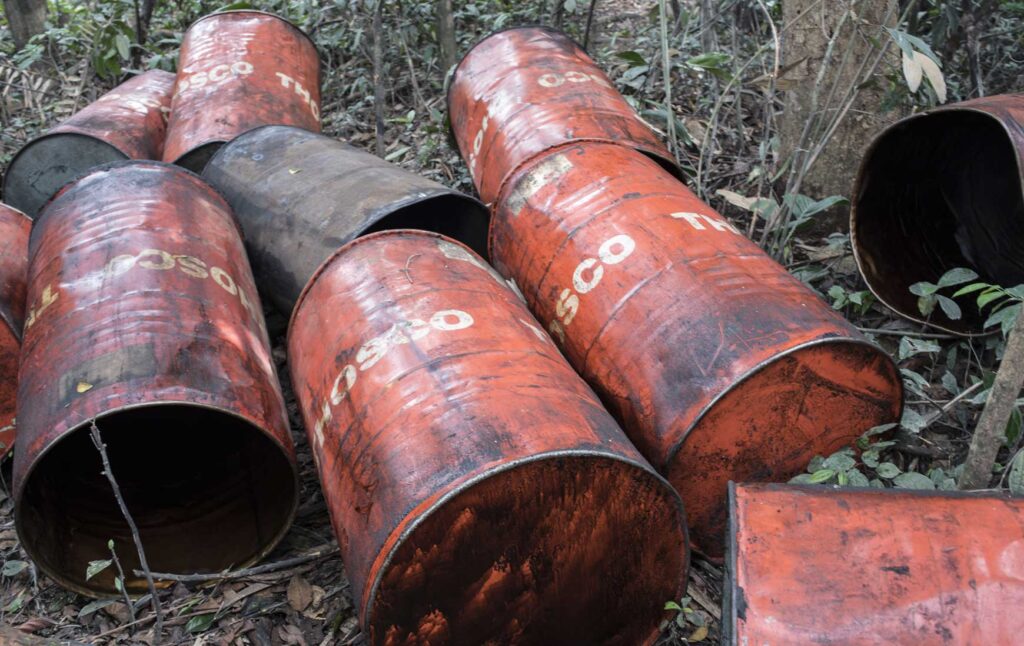
Other sectors of the economy were neglected, with agriculture ignored and limited investment in new infrastructure. While Nigeria had similar wealth per head at independence as Malaysia, for example, its per capita annual GDP now stands at $1,730, compared to $13,900 in Malaysia, according to the IMF’s 2023 World Economic Outlook.
It is welcome that Nigeria will celebrate 25 years of civilian rule in May this year, but corruption remains a huge problem despite the anti-corruption promises of all the main presidential campaigners. The Central Bank of Nigeria has made progress in tackling banking sector irregularities but progress has been limited elsewhere, and Transparency International ranked Nigeria 145th out of 180 countries in its 2023 Corruption Perceptions Index.
If some of those at the top have adopted such an approach, it is no surprise that this attitude has filtered down through society, particularly given the limited alternative economic opportunities. Some in the Niger Delta, which is the heart of the Nigerian oil industry, have taken a direct route, by stealing oil in a practice known locally as bunkering. One of the main methods is called “hot tapping”, which involves connecting a spur pipeline to an existing oil industry pipeline, to divert oil through multiple swamps and creeks to be offloaded onto barges or wooden boats for transport to waiting tankers.
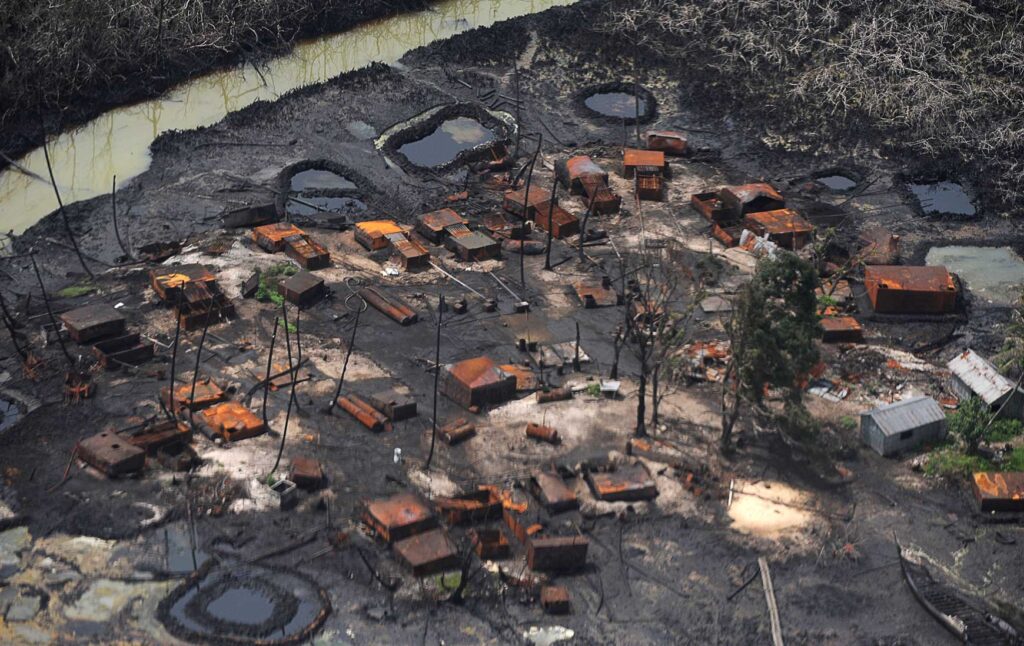
In “cold tapping”, oil gangs blow up a pipeline, putting it out of use long enough for them to attach their spur pipeline. Security is difficult because of the complex nature of the terrain and the fact that there are over 600 oil fields in the Delta, with more than 5,000 wells and 7,000km of pipeline. However, it is also difficult because of the scale of bribes paid to ensure that criminal activities are ignored. In 2003, when Brigadier-General Elias Zamani, then commanding a Niger Delta peacekeeping force, was asked whether oil was being stolen by local people, the security forces, government officials, or an international element, his reply was a simple “All”.
It is impossible to secure accurate statistics on just how much oil is stolen, partly because the level fluctuates, but most estimates are around 200,000 barrerls per day (b/d), with the state oil company, the Nigerian National Petroleum Company (NNPC), putting the figure as high as 437,000 b/d in 2022. The Nigeria Extractive Industries Initiative estimates that the country lost $46.16 billion to oil theft between 2007 and 2020.
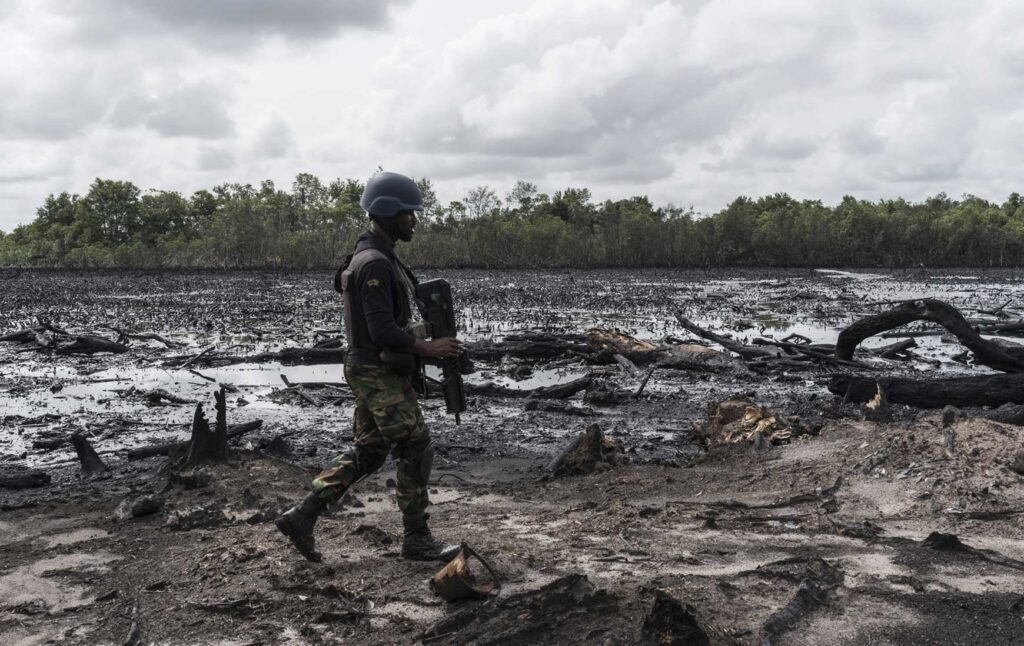
In one case in October 2022, a security contractor announced that it had found a 4km pipeline that a bunkering gang had built to divert oil production. The case is complicated by the fact that the security team was employed by a man called Government Ekpemupolo, widely known as Tompolo, who was awarded a N48 billion ($29.8 billion) security contract by the government just before the discovery. Yet Tompolo himself was previously responsible for blowing up oil pipelines. This could make him ill-suited for maintaining security or the ideal man for the job, depending on your point of view.
Tompolo told journalists: “Many of the security people are involved because there is no way you can load a vessel without settling [bribing] the security people” and suggested that the navy and army were also involved in bunkering. This seems almost certain, given that aerial surveillance is relatively straightforward and barges and tankers loading up with oil at unofficial points move very slowly.

The impact on the Niger Delta has been enormous. Pipeline explosions and oil industry practices that were not as careful as those in more industrialised parts of the world have resulted in many spills and widespread soil, water, and air pollution. This has generated a great deal of resentment among local people, who understandably contrast the wealth generated by the oil companies and those in power with the Delta’s deep-seated poverty. The oil-producing states are supposed to receive 13% of oil revenues, but there is little sign of this money on the ground, helping many to justify oil theft and other oil-industry crimes.
The feeling that everyone should benefit from oil led to the provision of government fuel subsidies until new Nigerian President Bola Tinubu surprisingly ended them on his first day in office in May last year. The subsidies gave rise to another form of petrocrime – fuel subsidy scams. As they made fuel cheaper in Nigeria than in neighbouring states, subsidies were claimed on large volumes of petrol and diesel that were actually smuggled out of the country.
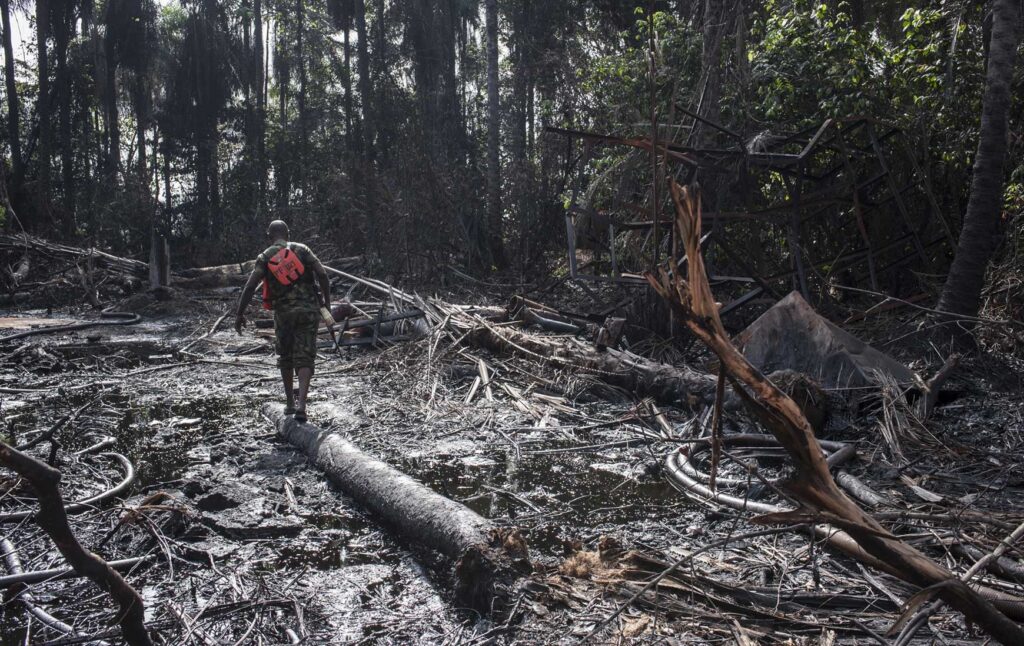
At the other end of the scale, some of the stolen oil is not shipped out of Nigeria but illegally refined within the delta. These facilities should not be regarded as industrial-scale refineries but rather as very small-scale operations, often with a handful of metal drums heated by wooden fires in forest clearings. This is a dangerous process and there are frequent accidents. In April 2022, an explosion at an illegal refinery in Ohaji-Egbema on the border of Rivers and Imo states led to more than 100 deaths. Those undertaking the actual work are paid very little, although those trading in illicit fuel can become extremely wealthy.
The state of Nigeria’s big industrial refineries adds another element to the mix. The Dangote refinery with 650,000 b/d capacity was completed in Lekki with much fanfare in May last year. However, the country already had four refineries with a combined production capacity of 450,000 b/d, similar to national fuel consumption, but they have operated at below-nameplate capacity or been entirely out of action for many years, forcing Nigeria to import much of its fuel requirements. Sabotage is regularly claimed in Nigeria but is difficult to prove.
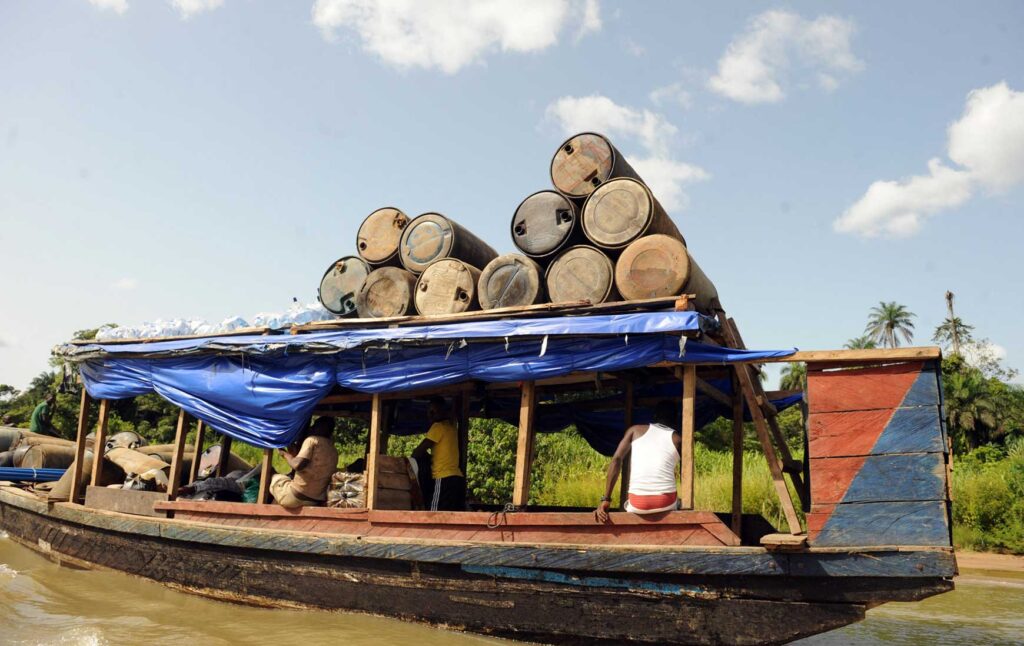
Products from illegal oil refineries stuck in jerry cans are ferried to the market in Bayelsa State of Niger Delta.
Photo: Pius Utomi Ekpei / AFP
Some oil gangs also appear to be behind pirate attacks in the Gulf of Guinea, either directly or by providing information on tanker movements to pirate gangs further west in Nigeria or on the border with Benin. However, the deployment of international naval patrols has eased this problem, with the International Maritime Bureau reporting just three pirate attacks in Nigerian waters in 2023, down from 48 in 2018.
Aside from the direct effects on the people of the Niger Delta, petrocrime and corruption also impact the oil industry. Due to two decades of attacks on oil industry infrastructure, the international oil companies that dominated the sector have opted not to invest in new onshore and shallow-water oil production in the Niger Delta. ExxonMobil, Equinor, and Eni have all sold assets in the region in recent years, and on 16 January this year, Shell announced that it had agreed to sell its Nigerian onshore subsidiary to a consortium of smaller Nigerian companies for $1.3 billion, much less than the assets would have originally been worth.
Low investment meant that Nigerian crude oil production fell close to one million b/d at times in 2022 – 23, down from a peak of 2.5 million b/d, according to the US Energy Information Administration. The foreign firms have retained their deepwater oil fields, which are located up to 200 nautical miles offshore and are much easier to protect from attack. The IMF calculates that oil accounts for about 90% of total Nigerian export revenues, but the country has the potential to produce 4 million b/d, so it could earn much more from the industry.
The relationship between corruption and underdevelopment in the Niger Delta is a circular one. Corruption and pollution created an environment that gave rise to oil bunkering gangs, militant groups, and piracy. These in turn make it challenging to earn a good living through legitimate means, further encouraging crime and corruption. Nigerian leaders have thus far lacked the political will to tackle the problem, but it will be interesting to see if Tinubu’s hard line on subsidies is matched by a new focus on the Delta’s problems.

Dr Neil Alexander Ford has been a freelance consultant and journalist on African affairs for more than two decades. He covers a wide range of topics from international relations and organised crime to cross-border trade and renewable energy. Consultancy clients include international organisations, law firms and financial services companies, and he has acted as an expert witness in Africa-related legal cases. He has a PhD on East Africa’s international boundaries, ranging over the effect on regional economies; cross-border political disputes; and the impact of the boundaries on local communities, such as the Maasai.


